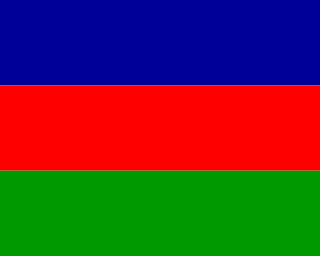 |
|---|
| This article is part of a series on the politics and government of Zambia |
Government |
Legislature |
The National Party is a political party in Zambia.
 |
|---|
| This article is part of a series on the politics and government of Zambia |
Government |
Legislature |
The National Party is a political party in Zambia.
The party was established in August 1993 by a group of nine MPs who had left the Movement for Multi-Party Democracy after the government refused to investigate corruption allegations against senior ministers. [1] [2] The new party won five of the by-elections forced by their resignations from the MMD. [3]
Former minister Humphrey Mulemba was the party's presidential candidate in the 1996 general elections, finishing third in a field of five candidates with 7% of the vote. In the parliamentary elections the party nominated 98 candidates, [4] receiving 7% of the vote and winning five seats in the National Assembly, making it the largest opposition party amidst a United National Independence Party boycott.
In 2000 Sam Chipungu was elected party president. [5] In the 2001 general elections it did not run a presidential candidate, but supported Anderson Mazoka of the United Party for National Development, [6] who finished as runner-up. In the parliamentary elections it received just 0.07% of the vote and failed to win a seat, having disintegrated after the death of Mulemba in 1998 and interim leader Daniel Lisulo in 2000. [7]
In 2011 National Party leader Richard Kambulu contested a single seat in the parliamentary elections, receiving only 193 votes (0.01%). [8] Kambulu also considered running for the 2015 presidential elections but opted not to. [9]

The politics of Zambia takes place in a framework of a presidential representative democratic republic, whereby the President of Zambia is head of state, head of government and leader of a multi-party system. Executive power is exercised by the government, while legislative power is vested in both the government and parliament. Formerly Northern Rhodesia, Zambia became a republic immediately upon attaining independence in October 1964.
The Movement for Multi-party Democracy (MMD) is a political party in Zambia. Originally formed to oust the previous government, MMD controlled an absolute majority in parliament between 1991 and 2001, when its past leader, Frederick Chiluba was President of Zambia. Its election into power in 1991 ended the 27-year rule of President Kenneth Kaunda and his United National Independence Party (UNIP). It remained the dominant party within Zambian politics until the general elections of September 2011.

The United Party for National Development (UPND) is a liberal political party in Zambia, led by Hakainde Hichilema. The party is an observer member of the Africa Liberal Network.

The United National Independence Party (UNIP) is a political party in Zambia. It governed the country from 1964 to 1991 under the socialist presidency of Kenneth Kaunda, and which was the sole legal party between 1973 and 1990.

Elections in Benin take place within the framework of a multi-party democracy and a presidential system. Both the President and the National Assembly are directly elected by voters, with elections organised by the Autonomous National Electoral Commission (CENA).

Elections in Zambia take place within the framework of a multi-party democracy and a presidential system. The President and National Assembly are simultaneously elected for five-year terms.

The Heritage Party is a political party in Zambia.

The Zambia Republican Party is a political party in Zambia.
Peter Marvin William Daka is a Zambian politician. He currently serves as a Member of the National Assembly for Msanzala.

The National Council for the Defense of Democracy is a political party in Burundi.

The Movement for the Liberation of the Central African People is a political party in the Central African Republic. It has been an observer member of the Socialist International since 2008, and is also a member of the Progressive Alliance.

The Central African Democratic Rally is a political party in the Central African Republic.

The United Liberal Party (ULP) is a political party in Zambia.
Enoch P. Kavindele is a Zambian businessman and politician who served as the Vice-President of Zambia from 2001 until 2003.

General elections were held in Zambia on 19 December 1968 to elect the National Assembly and President. The first post-independence polls saw incumbent Kenneth Kaunda retain his post as president, whilst his United National Independence Party, the only party to field candidates in all 105 constituencies, won 81 of the 105 seats in the National Assembly. Voter turnout was 82.5% in the parliamentary election, but 87.1% in the presidential election.

General elections were held in Zambia on 11 August 2016 to elect the President and National Assembly. A constitutional referendum was held alongside the elections, with proposals to amend the bill of rights and Article 79.

The Movement for Democracy and Development is a political party in the Central African Republic, established by former President David Dacko. It is currently led by Louis Papéniah.

The Zambia Democratic Congress (ZADECO), also known as the Zambia Development Conference, is a political party in Zambia.

The Agenda for Zambia (AZ) was a political party in Zambia active between 1996 and 2002. The party was associated with Akashambatwa Mbikusita-Lewanika and his sister Inonge Mbikusita-Lewanika, and drew most of its support from people in Western Province.
Edith Zewelani Nawakwi is a Zambian politician and economist by profession. She is the first woman in Zambia to hold the post of Minister of Finance following her appointment in 1998 since Zambia's independence 33 years previously to that time. She was also the first woman to hold that post in the SADC region. She is the President of the Forum for Democracy and Development under which she ran for president at the 2016 general election.